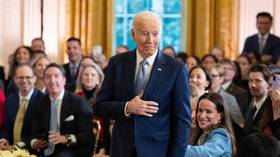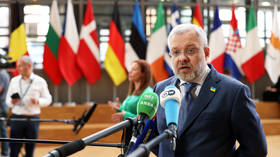‘Can’t participate, can’t communicate’: Day 3 of Assange’s US extradition hearing as it happened
The third day of Julian Assange’s extradition hearing saw lawyers honing in on the particulars of a US-UK extradition treaty, and unexpected drama as the whistleblower spoke to complain about lack of access to his defense team.
Proceedings began with a note of housekeeping from Judge Vanessa Baraitser, who said a photograph had been taken in court earlier in the week. She reminded attendees that this is a criminal offense, and said she would consider the culprit “in contempt” of court.
For the third day running, Assange sat in the glass-fronted dock, wearing a suit jacket, inspecting his notes and able to communicate with his lawyers only through holes in the glass. At the outset, his lawyers cautioned that he was on medication and may need occasional breaks.
Also on rt.com Press freedom will be ‘thing of the past’ if British help Americans get their way with Assange – Irish MEP‘Political offenses’
The crux of the defense’s argument was that, since Assange is charged under the US Espionage Act, he is wanted for “political offenses,” and extraditing under these circumstances would be unlawful under the 2003 US-UK extradition treaty.
Edward Fitzgerald QC argued that the exception for political offenses under the treaty is an essential and “fundamental” protection which the US includes in all of its extradition treaties to protect their own citizens abroad. This protection seems to fall by the wayside, however, when the US wants a foreign citizen extradited, he said.
Day 3 of Assange hearing kicks off and starts with defence presenting Anglo-US treaty where ‘extradition shall not be granted if relating to political offence - regarded as a fundamental protection’
— NADIRA TUDOR (@nadiratudor) February 26, 2020
Fitzgerald worked to establish that Assange’s extradition for political offenses is illegal under English domestic law, as well as under the European Convention on Human Rights (Article 5) and the bilateral treaty. Unless the charges relate to terrorism or violence, a person should not be extradited for political offenses. This fact is “virtually universal,” he said.
There was a back-and-forth between Fitzgerald and the judge, who said the “political offenses” provision was removed from the UK’s Extradition Act of 2003. Fitzgerald argued that this was “not determinative” and that it is still included in the treaty itself.
No ‘treason’ possible
Observing proceedings, Italian journalist Stefania Maurizi, who has worked with WikiLeaks for over a decade, tweeted to complain that Baraitser was speaking so quietly that even reporters very close to the judge could hardly hear. “How can Julian Assange hear her words, considering he is 5 meters from her in a glass wall box?” she wrote.
The defense also sought to establish that the US charge of “conspiracy to commit computer fraud” is an espionage offense and that this is a political offense, not a criminal one. Obtaining information that a state wants hidden is a “pure political crime,” he said.
Also on rt.com Assange blasts court for preventing communication with lawyers, alleges legal team is being SPIED onHe asked Baraitser to consider the scenario of an NGO worker in China uncovering and making public information on executions by the Chinese government and then being charged by that state with espionage.
Fitzgerald noted that Republican lawmakers in the US had accused Assange of “treason,” and asked how an Australian citizen could possibly commit treason against the US.
‘No rights under treaty’
Following an hour's lunch break, James Lewis QC for the prosecution rose to respond and accused Fitzgerald of making "fundamental errors" in his argumentation.
He contended that Assange can't derive legal rights under the UK-US treaty since it was not incorporated into domestic law and challenged Fitzgerald’s claim that the whistleblower is wanted for “political offenses.”
Lewis argued that British courts cannot apply rights from international treaties that are not established in English law and that the 2003 UK Extradition Act supersedes the treaty.
Also on rt.com Assange extradition hearing is Damocles sword over journalists’ heads. But UK mainstream media participate in his crucifixion‘Spying on my lawyers’
The most dramatic moment of the day came around 2:30pm when Baraitser asked Assange if he felt well enough to continue. He complained that he was unable to privately communicate with his lawyers, claiming there were guards in the glass dock with mics.
The magistrate interrupted to say he was only permitted to speak to the court through his lawyers. When he began to speak again, she told him no exception would be made and called a five-minute recess to allow him confer with his team.
“This case already has enough spying on my lawyers as it is,” Assange added. The complaint was consistent with grievances aired by his defense team for months about lack of access to Assange at Belmarsh Prison and US spying at the Ecuadorian Embassy, where he spent seven years after seeking asylum in fear of extradition.
Defence tells judge that Assange not happy that he’s not sitting in dock next to his lawyer. Says they will apply in morning to see if he can. Judge asks Lewis what he thinks. He says has known a defendant to be handcuffed to security and sitting next to lawyer in dock
— NADIRA TUDOR (@nadiratudor) February 26, 2020
When court resumed, Fitzgerald said the defense would make an application for Assange, who is “no threat” and a “gentle man,” to be allowed to sit with his lawyers on the benches outside the dock going forward.
Baraitser was reluctant to agree, arguing that release from the dock would require an application of bail. To the surprise of some journalists, Lewis took a more lenient position than the magistrate, saying the prosecution maintained a neutral stance on Assange being allowed to sit with his lawyer — if flanked by security and not released from custody. It was decided that an application for Assange to sit with his lawyers would be considered overnight.
Also on rt.com Assange supporters march in London ahead of extradition hearingProceedings resumed for a final 30 minutes, with Lewis arguing that there is no such thing as a "political crime" in English domestic law.
Court adjourned shortly after 4pm, after Assange indicated that he couldn't concentrate any longer. He looked to his supporters in the public gallery and raised his fist above his head as he exited the dock.
The extradition hearing is set to resume at 10am on Thursday.
Think your friends would be interested? Share this story!














